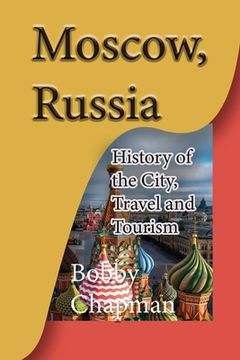Reseña del libro "Moscow, Russia: History of the City, Travel and Tourism (en Inglés)"
Moscow, Russia. History of the City, Travel and Tourism. Moscow is a city of tremendous power and energy. Hulking gothic towers loom over broad avenues that form a sprawling web around the Kremlin and course with traffic day and night. The Soviet past looms large, but the city embraces capitalism with gusto. Although Muscovites are protecting some of their architectural heritage, they're also creating a new, often controversial legacy in the form of soaring skyscrapers and shopping malls. With a population of more than 11 million, Moscow is Russia's largest city and, indeed, the largest and one of the most rapidly changing cities in Europe. Founded in the 12th century as the center of one of several competing principalities, Moscow eventually emerged as the heart of a unified Russian state in the 15th century. One hundred years later it had grown into the capital of a strong and prosperous realm, one of the largest in the world. But under Peter the Great (1672-1725), the city was demoted. Influenced by his exposure to the West, Peter deliberately turned his back on the old traditions and established his own capital St. Petersburg on the shores of the Baltic Sea. Yet Moscow continued to thrive as an economic and cultural center, and more than 200 years later, within a year of the Bolshevik Revolution in 1917, the young Soviet government restored its status as the nation's capital. The city became the undisputed political and ideological center of the vast Soviet empire. And even though it has been nearly two decades since that empire broke apart, the city retains its political, industrial, and cultural sway as Russia's capital. It's the home of some of the country's most renowned cultural institutions, theaters, and film studios. It's also the country's most important transportation hub even today many flights to the former Soviet republics are routed through Moscow's airports. To fortify and spur forward Russia's giant economy, the government and city's business communities actively court outside investments and set ambitious economic agendas. For visitors, this translates into a modern, fast-paced city with an increased availability of Western-style services and products. But even as Moscow becomes a hub of international business activity, it's determinedly holding onto its Russian roots. Restaurant kitchens, many of which strove to satisfy Russians' thirst for foreign tastes in the '90s, are turning back to the country's native cuisine, serving gourmet borscht and delicious pelmeni (bite-sized dumplings). Retro Soviet nostalgia is chic with young hipsters who were barely born before the Soviet Union split up. Business deals may no longer be made over a banquet table and sealed with a shot of vodka, but Muscovites take hospitality seriously, as a visit to any private home will show you. This tradition of welcoming with open arms has persisted alongside a less generous Soviet mentality, however: stubborn indifference remains the default attitude of staff at some hotels, restaurants, and stores. This is gradually fading, but you might still be faced with surly ticket sellers or even ungracious hotel employees, especially if trying to communicate strictly in spoken English. As Russia enters its third decade of post-Soviet life, development and reconstruction are at an all-time high. Parts of Moscow, especially within the Boulevard Ring (Bulvarnoye Koltso), are now clean, safe, and well kept. Many of these buildings are designed to be harmonious with the ancient Russian style, but there are a growing number of shockingly modern steel-and-glass office towers, particularly in central Moscow. The decades ahead promise more change and hurdles to overcome. But this city has survived devastating fires, an invasion by Napoléon, and more than half a century of alternating demolition and breakneck construction by the Soviets. Moscow is ready for anything.

